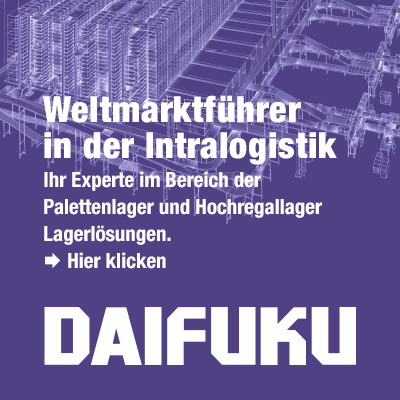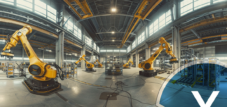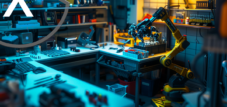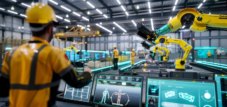Innovative solutions with low code ecosystems and robotics for the electrical and logistics industry-a shortage of skilled workers? Was yesterday!
Xpert pre-release
Language selection 📢
Published on: March 2, 2025 / update from: March 2, 2025 - Author: Konrad Wolfenstein

Innovative solutions with low code ecosystems and robotics for the electrical and logistics industry-a shortage of skilled workers? Was yesterday! - Image: Xpert.digital
Coping the German shortage of skilled workers: Innovative solutions with low-code ecosystems and robotics for the electrical and logistics industry
How low-code and robotics in Germany can solve a shortage of skilled workers
Germany is on the crossroads. The shortage of skilled workers, once a quiet warning signal, has grown into a storm that threatens the foundations of our economy. Especially the electrical and logistics industry, the backbone of our prosperity, groan under the load of vacant places. But in the middle of this crisis, hope germinates-innovative technologies such as low-code ecosystems and robotics not only promise short-term relief, but also a fundamental transformation of the world of work. This report reveals how these technologies drive the digital revolution in logistics, create new working models and point out the way out of skilled workers. Discover how Germany can secure its competitiveness and emerge strengthened from this challenge. Don't miss these essential insights into the future of work!
The results of this analysis clearly show that the intelligent integration of low-code platforms and robotic solutions is far more than just a short-term emergency measure. It enables companies to close the gaping gap in the staff and at the same time promote comprehensive digital transformation. These technologies not only increase productivity and efficiency, but also create completely new operating models that are less dependent on traditional qualifications and rigid personnel structures. An impressive advantage of low-code platforms lies at their speed: Companies report a 10 to 20-fold application development compared to conventional programming methods. At the same time, the robotics revolutionize automation and makes it accessible to small and medium -sized companies (SMEs) through falling costs and more user -friendly solutions.
The escalating shortage of skilled workers in Germany: a challenge for society as a whole
The shortage of skilled workers in Germany has developed from a worrying trend to an acute economic crisis in recent years. What was once perceived as a regional or industry -specific problem is now a challenge that affects all sectors and regions in the country. The numbers speak a clear language: According to the current survey data of the Federal Association of Logistics (BVL), frightening 90 percent of the logistics companies feel the effects of the shortage of skilled workers. Almost half (43 percent) even state that this defect has significant negative consequences for your daily operating processes. In order to illustrate the drama of this development: in 2009, i.e. just a decades and a half ago, less than 10 percent of companies reported on problems in connection with missing specialists. In the fourth quarter of 2024, however, around 45 percent of the storage companies reported business impairments due to unoccupied positions. This rapid increase illustrates the speed and the extent of the tightening of the shortage of skilled workers.
The logistics industry is particularly affected by this trend. Current estimates assume around 50,000 vacant positions in the entire industry. Camp logistics are a special problem area within logistics. Activities in this area are often perceived as less attractive, since they traditionally offer lower added value and are often associated with physically exhausting work. In addition, many logistics companies have difficulty adapting their recruitment strategies to the changing conditions of the labor market. They not only compete with each other, but also with other industries that can often offer more attractive working conditions and career perspectives. This competitive disadvantage also complicates logistics companies to gain qualified talents and to bind in the long term.
For German medium -sized companies, the backbone of the economy, the shortage of skilled workers represents an existential danger. Almost three quarters of medium -sized companies see the greatest obstacle to their growth and economic development in the lack of qualified employees. While large corporations are increasingly relying on technological solutions such as robotics in order to maintain or even increase their productivity despite personnel bottlenecks, many SMEs are missing the necessary resources - both financial and professional nature - to follow this example. This discrepancy threatens to further increase the differences in competition between large companies and the middle class and to change the structure of the German economy sustainably. The danger of a two -tier society, in which only large, technologically advanced companies can exist in global competition, while the medium -sized company, which stands for innovation and diversity, falls behind.
The causes of the shortage of skilled workers are diverse and complex. They range from demographic changes to deficits in the education system to changed social preferences. The demographic change, in particular the aging population and falling birth rates, leads to a natural decline in the potential for workers. At the same time, the education system has not adequately adapted to the changing requirements of the labor market in some areas. There is often a mismatch between the qualifications that graduates have, and the skills that companies actually need. In addition, the attractiveness of certain apprenticeships, especially in technical areas, has subsided in the eyes of young people. Many prefer a degree in dual training, which leads to a lack of specialists in craftsmanship and technical professions. Social trends also play a role. Work-life balance, flexible working models and meaningful activities are becoming more important for many employees. Industry that cannot meet these needs adequately have more difficult to win qualified employees.
Suitable for:
- Global shortage of skilled workers: skilled workers from abroad? Why the market doesn't cooperate and the arguments are ethically questionable
Critical need for electricians in modern logistics: more than just one professional field
Among the professional groups affected by the shortage of skilled workers, electricians and electronics technicians can be found. Your expertise is of immense importance in modern logistics and at the interface between logistics and energy systems. The demand for specialists for electrical installations in construction is enormous. Current figures prove a specialist in 18,343 people at a job overhang rate of almost 80 percent. This means that almost five vacancies come up to each available specialist. Electrical installers are one of the most sought -after specialists on the German labor market. There is a similar situation in the electrical engineering industry, where a specialist piece of 8,519 and a job overhang rate of over 83 percent are recorded. These figures illustrate the critical scarcity of electrotechnical specialists.
These highly qualified technical specialists are indispensable for modern logistics companies. Warehouses develop rapidly and are increasingly automated, digitized and energy -efficiently designed. Industrial electricians who are responsible for installation, maintenance and repair of electrical systems in industrial environments are regionally among the most wanted specialists. Your expertise is essential for smooth operation and maintaining the complex electrical infrastructure of modern warehouses - from state -of -the -art automated sorting systems and conveyor belts to sophisticated energy management solutions and safety systems. Without qualified electricians, these systems cannot be operated and serviced efficiently, which can lead to production failures, delays and higher costs.
However, the importance of electricians in logistics extends far beyond traditional warehousing. They are key players for the energy transition and the implementation of ambitious sustainability goals in the industry. A current report by the Competence Center Safety Security (KOFA) explicitly identifies construction electricians as a “bottle neck for the energy transition”. The skilled worker in this profession has increased by almost three percentage points compared to the previous year. These specialists are urgently needed to install solar systems in warehouse roofs, connect operating facilities to renewable energy sources and integrate innovative energy storage systems. These measures are crucial to increase operational resistance, reduce the dependence on fossil fuels and significantly reduce the CO₂ footprint of the logistics industry.
Electronics engineers for energy and building technology that work in the construction industry also play a central role in the context of modern logistics. They specialize in the installation of sustainable energy supply systems and intelligent building technologies. Your specialist knowledge is becoming increasingly important in the logistics industry, since logistics locations are increasingly relying on smart building technologies in order to optimize energy consumption, reduce operating costs and increase the overall efficiency. Operating electricians complement this ecosystem by implementing renewable energy systems, integrating them seamlessly into existing power grids and providing the necessary charging infrastructure for growing electromobility in the logistics industry. The transition to more sustainable and electrified logistics is simply not feasible without a sufficient number of qualified electricians.
Low code ecosystems as a strategic answer to the shortage of skilled workers: democratization of technology
The shortage of skilled workers meets an unprecedented demand for digital transformation in almost all economic sectors. Digitization is no longer a trend, but a necessity to survive in global competition and to counter the challenges of the 21st century. Paradoxically, however, the number of vacant positions for IT specialists in German companies has more than doubled since 2017. This lack of IT specialists represents an additional needle to which technological progress hinders when it is most urgently needed to cope with the shortage of workers in other areas. This apparently hopeless situation has massively strengthened interest in innovative solutions such as low-code platforms. Low code promises democratization of software development and process automation and opens up completely new opportunities to promote digital transformation.
Suitable for:
- Entering robotics without prior knowledge: How small and medium-sized companies (SMEs) benefit from robotics solutions
Low code describes a revolutionary approach in software development, in which specialized platforms also enable people without profound programming knowledge to develop complex software applications. Instead of laboriously writing code, applications are created using configurable, visual building blocks and drag-and-drop surfaces. These “configure” method significantly reduces the entry hurdle for the development of digital solutions and makes technology accessible to a wider range of users. It allows specialist users who have detailed domain knowledge, but only limited technical skills have to create functional applications independently and to optimize their business processes. For logistics companies that also suffer from a lack of technical specialists in general and IT specialists in particular, this technology offers particularly convincing added value. It makes it possible to reduce the dependency on scarce IT resources and to strengthen innovative strength in the company.
The practical applications of low code in logistics are diverse and grow steadily. At trade fairs such as the logiMat, companies regularly present innovative low code solutions for the logistics industry. One example is Engomo GmbH, which shows under the motto “Your Warehouse Made Better” how companies can use their low-code technology to extend and optimize warehouses. Your platform enables the fast and uncomplicated development of apps to replace the previously paper -based processes with intuitive mobile applications on smartphones, tablets or robust industrial scanners. Advanced implementations include solutions for free-handed scanning with data glasses, pick-by-light systems for picking optimization and even controlling complex warehouse robots such as Autostore. The possibilities are almost unlimited and are constantly expanded by the continuous further development of low-code technology.
The efficiency increases that can be achieved by using low-code platforms are impressive. Numerous case studies show that applications with low code tools can be developed ten to twenty times faster and more cost-effective than with traditional methods of software development. This enormous acceleration is of crucial importance for logistics companies that adapt agile to changing market conditions, quickly react to new customer requirements or have to compensate for the acute shortage of labor at short notice. Low code enables companies to implement urgently needed digital solutions in the shortest possible time without having to wait long for the availability of scarce IT resources. This agility and responsiveness are invaluable in the fast -moving logistics industry.
Another decisive advantage of modern low-code platforms lies in their excellent ability to integrate. Through prefabricated plug-ins and standardized connectors, solutions such as Engomo enable seamless integration into existing system landscapes. This is particularly important for logistics companies that often have complex and heterogeneous IT environments. Low code platforms ensure that companies benefit from optimized processes and user-friendly app solutions, while at the same time a central, current and correct database is preserved in the backend. The risk of isolated island solutions or incompatible data silos is minimized. This interoperability is essential for successful and sustainable digital transformation in logistics. It enables companies to protect their existing IT investments and gradually modernize instead of having to replace everything at once.
Xpert partner in warehouse planning and construction
Efficiency increase through automation: solutions for the logistics industry
Robotics and automation: The physical answer to the shortage of workers in logistics
While low-code platforms primarily address the software side of the problem and accelerate the development of digital solutions, robotics and automation technologies offer concrete physical solutions for the urgent shortage of labor in logistics and warehousing. They enable companies to automate physically exhausting, repetitive or dangerous tasks and thus relieve human workers and use them more efficiently. However, the hurdles for the use of robots in logistics were traditionally high. High acquisition costs, complex programming and complex maintenance requirements have long limited implementation to large companies with corresponding financial and technical resources. However, the latest developments in the area of “low-cost robotics” and “user-friendly automation” have initiated a paradigm shift. These technologies are becoming increasingly affordable, easier to use and thus also accessible to small and medium -sized companies (SMEs).
The merging of robotics with artificial intelligence (AI), especially with methods of mechanical learning, drives automation in camps with unprecedented speed. AI-based image recognition procedures now enable reliable and robust parts detection even under difficult conditions and at the same time fast cycle times. Advanced skills such as “Bin picking” allow robots to recognize previously unknown objects in chaotic environments, to grab precisely and to place optimally in packaging or containers in order to use the available space at the maximum. These intelligent technologies offer a direct and effective answer to the shortage of skilled workers by automating tasks that traditionally required qualified and experienced human labor. They enable companies to reduce their dependence on human work in certain areas and at the same time increase productivity and efficiency.
Cost reductions in robotics are systematically advanced through technological innovations. An example of this is the Drylin XXL portal robot from Igus. While conventional palletry robots, which are often developed and integrated in cooperation with external service providers, cost between 85,000 and 120,000 euros and are therefore simply unaffordable for many smaller companies, the price of the Drylin XXL is between 7,000 and 10,000 euros depending on the configuration - a drastic reduction in the investment hurdle. This significant reduction in costs makes automation accessible to a much wider corporate landscape and often enables the investment of the investment within a few weeks or months instead of only years. This is particularly attractive for SMEs who usually have limited financial resources and need fast return-on investment cycles.
Democratization of the robotics is also promoted by do-it-yourself kits, which can also be assembled and put into operation by companies without special robotics knowledge. The Drylin XXL is supplied, for example, as a kit, which contains all the necessary components such as timing belt axes, rack axes and stepper motors. It offers a generous work space of 2,000 x 2,000 millimeters (expandable to up to 6,000 x 6,000 x 1,500 millimeters). Users can assemble these components into a functional linear module robot within a few hours-without external help, special previous knowledge or lengthy training courses. This innovative concept significantly lowers the technical and financial hurdles for the introduction of automation and also enables smaller companies to benefit from the advantages of robotics.
The integration of no-code and low code solutions with robotics represents a particularly promising development. Platforms such as Artiminds RPS or Artiminds Lar make robot programming considerably easier, analyze complex processes automatically and enable automation of demanding tasks. This integration opens up completely new fields of application for robotics, reduces the training effort for employees and increases both operational flexibility and the innovative ability of the company. Through the intelligent combination of the physical skills of robots with the programming accessibility of low-code platforms, companies can implement comprehensive automation solutions-despite limited technical specialists and IT resources. These synergy effects are crucial to effectively combat the shortage of skilled workers and to ensure the competitiveness of the German logistics industry in the long term.
Suitable for:
- Automation for SMEs: too expensive? Too complicated? Robots in craft and logistics? Wrongly thought!
Integrated approaches: combine technology with further training and retraining
Technological solutions such as low code and robotics offer an important short-term relief for the shortage of skilled workers, but sustainable strategies are mandatory to link with comprehensive training and retraining initiatives. Technology alone cannot completely solve the problem. A majority of the logistics experts (over 60 percent) are firmly convinced that career changers from other industries can make a significant contribution to the alleviation of the shortage of skilled workers in logistics. This approach recognizes that with suitable training programs and the support of intuitive technologies, specialists from adjacent or related areas can successfully switch to logistical professions and can quickly establish themselves there.
The intelligent combination of further training, low code and robotics creates a positive cycle that can change the world of work sustainably. Due to the increasing automation and simplification of software development, the necessary qualifications and competence profiles change in many professions. Tasks that previously required deep technical knowledge and years of experience can be redesigned and adapted that they can also be taken over by employees with other competence profiles - supported by user -friendly, intuitive interfaces and automated systems. The focus is on purely technical skills to overarching skills such as problem -solving ability, adaptability and the ability to work with technology.
A concrete example of this integrated approach is the real-time data exchange between transporters and storage. By using modern low-code platforms, logistics companies can develop efficient systems that enable seamless communication and a transparent flow of information between all those involved. This leads to precise preparation for inputs, optimized loading times and minimized waiting times. Similar efficiency increases and process optimizations result from the use of AI-based applications for route optimization, intelligent picking systems and dynamic resource allocation. These technologies not only relieve the employees of routine tasks, but also enable them to focus on more demanding and more value -added activities.
Suitable for:
A multi -layered answer to complex challenges - technology as an enabler
The shortage of skilled workers in electricians with specific experience in logistics and warehousing undoubtedly a significant challenge for German industry and especially for the logistics sector. But there is also an opportunity in every crisis. The shortage of skilled workers acts as a catalyst for technological innovations and the basic redesign of operating processes. Companies are forced to think beyond traditional approaches and to take new ways in order to maintain their competitiveness and to secure their future viability.
The strategic use of low-code ecosystems and robotic solutions not only offers companies the opportunity to react to the acute shortage of workers in the short term. Rather, these technologies enable the structure of long -term more resistant, more agile and efficient operating processes. The intelligent combination of these innovative technologies with targeted training and retraining initiatives is the most promising path to a future in which the German logistics industry can continue to take a global position despite the shortage of skilled workers and develop its innovative strength. Technology is not just a problem solving tool, but an enabler for a fundamental transformation of the world of work and the creation of new, attractive jobs in the logistics of the future.
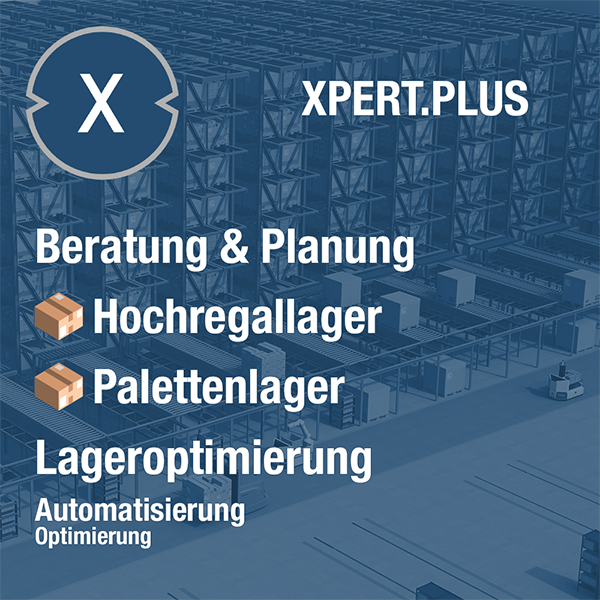
Xpert.Plus warehouse optimization - high-bay warehouses such as pallet warehouses consulting and planning
We are there for you - advice - planning - implementation - project management
☑️ Xpert.Plus - logistics consulting and logistics optimization
☑️ Industry expert, here with his own Xpert.Digital Industry Hub with over 1,500 specialist articles
I would be happy to serve as your personal advisor.
You can contact me by filling out the contact form below or simply call me on +49 89 89 674 804 (Munich) .
I'm looking forward to our joint project.
Xpert.Digital - Konrad Wolfenstein
Xpert.Digital is a hub for industry with a focus on digitalization, mechanical engineering, logistics/intralogistics and photovoltaics.
With our 360° business development solution, we support well-known companies from new business to after sales.
Market intelligence, smarketing, marketing automation, content development, PR, mail campaigns, personalized social media and lead nurturing are part of our digital tools.
You can find out more at: www.xpert.digital - www.xpert.solar - www.xpert.plus





